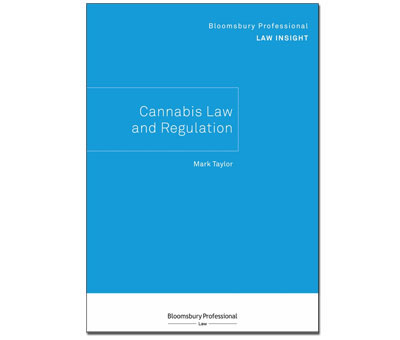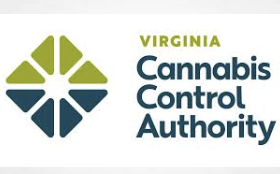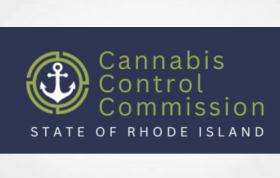It took twelve months of research, investigations and interviews (and about five weeks of non-stop writing with some very late nights and a lot of coffee) to produce my book on cannabis law and regulation, which is out now with Bloomsbury Professional. It is a detailed analysis of medicinal and recreational cannabis laws and regulations in the most active international jurisdictions, scoping out where change is happening.
It contains interviews with experts all along the chain from UN down to individual country level, and is a business tome for professionals looking to gain some legal and regulatory insight, however no prior knowledge of cannabis is presumed or necessary.
Writing for Cannabis Law Report over the last year and a bit helped lay the groundwork for the book and introduce me to a network of fantastic thinkers and legal minds, allowing me to report on what is going on and gain a unique perspective of the big picture.
Taking a step back, and a deep breath, I have considered my own takeaways from the work, what I have learned from the experience, and where the industry appears to be heading.
I’m not a scientist, or a politician, I don’t grow or sell cannabis, I don’t use cannabis medically or recreationally; I’m a journalist. I went into this with no skin in the game other than a promise to be independent and balanced, and to that end I am more interested in communications and sharing information.
Partisan politics
The most immediately jarring conclusion is how the issue of cannabis rescheduling is purely political at this point.
Members of the World Health Organization (WHO) and the Expert Committee on Drug Dependence (ECDD), responsible for conducting research into the effects of cannabis use, were surprisingly helpful and candid on the issue of reform (whether that remains the case after they read the book only time will tell).
They have officially recommended that cannabis should be moved to a different, less stringent category, and appear frustrated that UN political representatives are stopping that from happening by voting along partisan lines.
It is is maddening for those who are pushing for change, as the science is speaking for itself, but it really does seem only a matter of time before something gives in the WHO voting blocs. Why it has taken so long is worthy of the kind of public inquiry we will probably be denied.
Cannabis is, unfortunately, not an isolated case when it comes to examples of where our drug regulators are failing.
I asked the WHO about its response to the opioid crisis and claims it had deliberately played down concerns, only to leap into action far too late in the day once the damage was done. The WHO maintains it acted as rapidly as possible, but the fact we have an opioid crisis, entirely man-made and avoidable, is proof enough the WHO has failed in its duty. Similarly, it is also flunking its responsibility to patients and their families who require medicinal cannabis to live normal lives.
There are some incredibly hard-working and eminently sensible scientists at the WHO and ECDD who are hamstrung by the politicians and bureaucrats around them, but the organisation as a whole is in real need of a drastic overhaul. If it can no longer be trusted to protect public health, something drastically needs to change.
That said, the ECDD has some way to fall before it plumbs the depths currently occupied by another agency that has completely lost the run of itself and failed to keep in-step with modern thinking.
From bad to worse
The International Narcotics Control Board (INCB) exists to monitor compliance with the international drug treaties our countries are bound by, including the 1961 Single Convention on Narcotic Drugs; the main agreement covering cannabis.
The INCB is a troubled agency, evidenced most obviously in its lopsided criticism of territories that have opened recreational cannabis markets. Some US states argue they haven’t signed up to whatever the INCB is meant to be enforcing, so they aren’t accountable and don’t have to abide by the rules. Ultimately, the US as a whole is still a member of the international treaty regime, but appears to be taking the role of a parent absolving itself of responsibility for its delinquent children.
The INCB is at a loss to respond. It hasn’t condemned the US in the same way it has gone after other countries, making it appear more like a schoolyard bully rather than a mere hallway monitor there to ensure everyone sticks by. the rules.
Even when it does threaten, however, the INCB is an emperor without clothes. Its inability to pull back the countries who have opened recreational cannabis markets is a sign its power is extremely limited and its days could be numbered.
I’ve been a journalist for over a decade covering both local, national and international politics in that time, and have never encountered such an opaque, unaccountable, outdated and unfit for purpose body.
I tried for the best part of eight months to get a response (any response) from this organisation and failed. It holds meetings in secret, doesn’t release minutes even to member states, and the secretariat doesn’t respond to – or even acknowledge – any form of query.
For an organisation with such power to be completely closed off is unacceptable and a disgrace. Transparency of our regulatory bodies is critical to ensure they are working well.
Responding to crisis
The financial crisis of 2008 brought about wholesale change of how financial products were regulated, all over the world. The crash resulted in the creation of new international watchdogs and saw the introduction of new standards such as stress tests against risk and capital requirements. New regulations, new regulators:
In the same way, our response to acts of terrorism was the (in some cases such as the Paris and Brussels terror attacks extremely rapid) formation of new laws and task-forces to tackle the problems directly.
There certainly must be a balance when we regulate on the back of crises, in that while emotions run high it can be easy to go too far, but what of the war on drugs? This has been a brutal 60-year battle we continue to endure, while the executive organisations overseeing the state if play remain steadfast in place, as do the international agreements that frame the conflict.
It is clear we need to drag our international drug treaties into the modern world, and in rewriting and reforming the agreements we should also replace the INCB with an entirely new regulator fit for purpose.
Friends of the people
The story is remarkably different at domestic level. One of the most intriguing things I found during my research was the growing sense amongst national judiciaries that international drug laws no longer align with personal freedoms. It’s taken 60-something years, but courts are starting to back constitutional rights to freedom over international treaties, in matters of private cannabis use.
The judiciary has kept pace with the change in perception of cannabis use, viewing it through the prism of healthcare rather than crime, where international regulators and many governments have not.
Courts in areas such as South Africa, Georgia (the country), Argentina, Mexico, and Italy, have backed the individual right to consume cannabis, and in some cases are forcing governments to change their laws to accomodate the rulings. For balance, campaigners in India are one of the few to have lost their fight when arguing along these grounds, but it would not be a huge shock to see them win in court in the near future.
For all the criticism levelled at our justice systems, it is encouraging to see constitutional law grasp the nettle in regard to cannabis law. Change appears to be more likely to come through the legislative system than governments.
Emerging industries don’t come along very often
‘Cliche Bingo’ cards ready, yes this is clearly a rapidly emerging, energetic and dynamic sector. The formulation of new industries is a rarity, and in this case we are also observing how black market activity can evolve and adapt to life under the regulatory microscope.
Of course, there are also many, many people who have been active in cannabis for decades, and this is not a “new” industry at all. The combination of experience, wisdom and the optimism of the recent entrants is positively intoxicating, and has created an exciting buzz at events, but there will be bumps along the road and we should expect teething problems. We should also exercise patience.
I’ve been lucky in that those I consult with regularly, and the individuals who have helped out with research and insight, are the real deal. But, I have also met executives at events who do not seem to know the legal status of their own products, particularly when it comes to THC levels, which is worrying.
I covered Bitcoin and blockchain during arguably the peak hype years of 2012-2014, and am struck by the multiple parallels between the cryptocurrency and cannabis worlds. Not least that conference fatigue is real (!), but mainly in the number of evangelists and enthusiasts who believe they are on a path to change the world.
We’re not all going to get rich
The feeling of “we’re all going to get rich” soon began to permeate through almost every Bitcoin conference and event as mainstream media attention grew, and once the sheen came off and businesses began to pivot to blockchain, there was an air of desperation.
Many vocal proponents had backed the wrong horse, and it was not a coincidence that the boom of fraudulent Initial Coin Offerings emerged after the price of bitcoin started tanking.
I’ve met a lot of great people in the digital currency world, but also a lot of cranks and sharks. Events were full of people talking about how this technology would revolutionise everything. It hasn’t (yet). Hopefully cannabis won’t go the same way.
One differentiator is the drive, passion and desire of parents trying to change the law to help their children, and the doctors and scientists going against the grain of their profession to genuinely make a difference. This is inspiring and priceless, worth infinitely more than any “get rich quick” CBD (or blockchain) scheme anyway.
The plant
As exciting as times are, we must not forget there is a plant in the middle of all this.
With all the talk of markets, recreational and medicinal, trillion-dollar disruption, business cases, perhaps not enough attention is being paid to the plant itself.
A frequent complaint from cultivators and botanists is we are only just beginning to understand how powerful cannabis is, and what it is capable of, but the focus is on share prices and how to parlay licences.
The legal and financial restrictions on testing have brought us to a place where the fight is just to allow cannabis to be used to treat things in humans we understand it can help with. The known knowns, as Mr Rumsfeld would call them.
There is so much more we are yet to uncover, that we don’t know it can help with because of the existing barriers. The known unknowns, and the unknown unknowns.
Cannabis still has an image problem due to its associations in popular culture, in time hopefully the stigma will fade and the industry’s reputation will improve; less overt stonerisms at conferences and in marketing is necessary for a start.
The expansion of law firm practices, the continued influx of biopharmaceutical talent, and the entrance of regulated entities into the space from ancillary sectors should also help, but it won’t be overnight.
Although public opinion is more positive there is still a major ‘hearts and minds’ battle to be won, and the industry must be wary of the perception inside the cannabis bubble that everyone outside can see the benefits. It’s not quite full-steam-ahead-full-recreational just yet.
Regulation
Spoiler alert: the book ends with a chapter on where international regulatory reform is heading.
Although change in cannabis appears more likely to occur through courtroom judgments, there are an increasing number of governments around the world who believe rethinking cannabis regulation can help reduce the numbers of people in jail, cut crime, and better educate their citizens of the health impact of drug use.
This is a pattern evident everywhere from the Caribbean to parts of Asia where even discussing the topic was utterly taboo until very recently.
The governments of Luxembourg, Malta, Greece, and Uruguay were the most willing to share their vision of how cannabis can help them achieve these aims, of all the countries profiled in the pages.
Malta will be the first to admit it has a reputation for being rather too agreeable if it seems the conversation may end in business or capital heading its way. As a comparison, most of the bad actors fined and sanctioned by the UK Gambling Commission are Maltese operators, and the country needs to get a grip on its anti-money laundering controls, but there are heartening signs that its approach to cannabis regulation may be more stringent.
Luxembourg is a significant jurisdiction to watch over the next 12 months, as it has made no secret of its desire to open a recreational market. Although it is making neighbouring countries nervous, Luxembourg does seem to be conducting the project in the right manner.
The country has focussed on public health first and foremost, and is carrying out substantial research into the Canadian and Uruguayan models to strike a balance between outsourcing everything to private companies versus having the state run and control everything.
In the UK, the much-maligned NICE, for its part, answered all my questions, it gave explanations for its positions, and although it doesn’t always tell people what they want to hear, there is a chance for dialogue, which is encouraging. Healthcare professionals in the UK are overall still hugely resistant to cannabis therapies, however, and this is another ‘hearts and minds’ issue.
Most evidence leads us to the conclusion the Home Office changes of November 2018 did nothing to improve the chances of patient access to medicinal cannabis. The government can definitely do more, but the industry should also be asking hard questions of the doctors and specialists who have been so reticent to act.
Health Canada was not particularly forthcoming or willing to talk about what it thinks it has got right and wrong over the last year and half, which was disappointing. Canada is a trailblazer, and the rest of the world has eyes on what is happening, but the regulators were very reticent to talk about lessons learned, which is a shame. Perhaps we can rectify this in the Second Edition?
The clinical trials planned for the UK and Ireland, Switzerland, are some of the other most exciting medicinal cannabis developments to observe over the next 12 months. It goes without saying these types of projects can have a huge bearing on how later regulations are shaped.
There is also an enormous sense of excitement building in Australia, and the emergence of firms like FreshLeaf Analytics is a very positive sign. The capital territory was the first to push forward with recreational plans, and we should keep a keen eye on the battle between the ACT, the INCB, and the federal government.
Self-regulation is vital
Presently, it seems the existing situation in regard to international cannabis regulation is one where everyone loses, but it doesn’t seem too difficult or too much of a stretch to move to a place where, at the very least, everyone loses a little less.
The most important thing the industry can do to speed up positive change is encourage self-regulation. Peers can perhaps think about drafting operator guidelines, codes of conduct and the like for CBD, medicinal and recreational cannabis businesses.
This is one of the trends washing over adjacent sectors, along with sustainability and environmental credentials, that will be unavailable to avoid, so cannabis businesses may want to get ahead of these points now.
I believe tougher regulation up front is necessary, as it can be pared back later. The sums being thrown around about market sizes are blinding many to the realities of building up businesses in an emerging market, and we need strict rules to ensure high standards are baked in from the very beginning.
The cannabis industry has a real chance to avoid the mistakes of the alcohol and tobacco sectors over the last 20 years, especially around advertising and marketing, and honesty over public health (and especially mental health) matters. It would be very difficult to begin with weak regulation and expect firms to tighten up later on.
There is a window for cannabis to do things differently, but it won’t stay open forever.






























